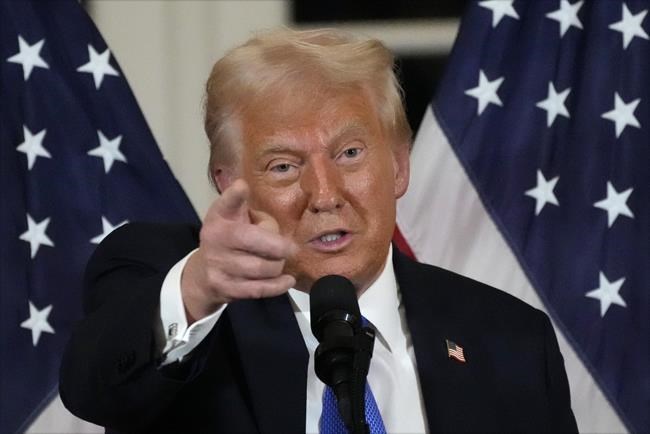
President Donald Trump speaks at a dinner with Senate Republicans at Mar-a-Lago in Palm Beach, Fla., Friday, Feb. 7, 2025. THE CANADIAN PRESS/AP-Ben Curtis
Republished February 09, 2025 - 9:46 PM
Original Publication Date February 09, 2025 - 1:56 PM
OTTAWA - U.S. President Donald Trump said he will formally announce 25 per cent tariffs on all steel and aluminum imports on Monday, including for Canada and Mexico.
Trump made the comments at a news conference aboard Air Force One as he travelled to New Orleans to watch the Super Bowl between the Kansas City Chiefs and Philadelphia Eagles.
Trump imposed steel and aluminum tariffs at 25 and 10 per cent respectively during his first term in March 2018 using national security as justification.
Canada was initially given an exemption to those duties, but was ultimately hit by the tariffs on May 31, 2018. Canada responded with a series of counter-tariffs on American products like Florida orange juice.
Nearly a year later, on May 17, 2019, the White House announced a deal had been reached to prevent "surges" in steel and aluminum supplies from Canada and Mexico, ending the trade dispute.
In reaction to Trump's announcement Sunday, Industry Minister Francois-Philippe Champagne posted on social media platform X, saying Canadian steel and aluminum support critical industries in the U.S. including defence, shipbuilding and auto manufacturing.
He said the existing trade relationship between Canada and the U.S. makes North America "more competitive and secure," and that the government will continue to stand up for Canada, its workers and its industries.
Catherine Cobden, president and CEO of the Canadian Steel Producers Association, said in a statement her group is "deeply concerned" about tariffs on steel and aluminum.
"When President Trump implemented tariffs on Canadian steel in 2018, we saw massive disruptions and harm on both sides of the border, hurting both America and Canada," Cobden's statement said before asking the federal government to intervene immediately with retaliatory tariffs.
Fox News aired a partial interview with Trump ahead of Sunday's football game, where he said he wants to see Canada become a state due to the unsubstantiated claim that the U.S. is "paying $200 billion a year" to its northern neighbour.
Trump said Canada would be "much better off" as a state, and said he'd be fine with "subsidizing" Canada if it was a state, an apparent reference to the U.S. trade deficit with Canada.
Statistics Canada says Canada's overall trade surplus with the U.S. was $94.4 billion in 2023, primarily due to oil exports.
Trump made the statehood comment in response to a question from Fox News anchor Bret Baier, who asked about Prime Minister Justin Trudeau's comments last week to a group of business leaders claiming Trump is not joking about making Canada a state.
"I think Canada would be much better off being a 51st state because we lose $200 billion a year to Canada, and I'm not going to let that happen," Trump told Baier.
"It's too much. Why are we paying $200 billion a year essentially in subsidy to Canada? Now, if they're a 51st state I don't mind doing it."
On Friday, Trudeau told a crowd of more than 100 business leaders at a Canada-U.S. economic summit in Toronto that Trump's comments about making Canada a state are "a real thing."
His comments about Trump were made behind closed doors after reporters were ushered out of the room. The Toronto Star was able to hear what Trudeau was saying because the audio was inadvertently broadcast.
Terry Sheehan, the MP for Sault Ste. Marie, Ont., which is home to Algoma Steel, posted to X on Sunday evening that the steel produced in Sault Ste. Marie is "used to make everything from armored vehicles to the Ambassador Bridge."
Bloc Québécois Leader Yves-François Blanchet said in a social media post directed at Trump that there is no scenario where the U.S. will produce enough aluminum to replace what it gets from Quebec before the end of the president's mandate.
He told Trump that he was exposing America's cutting-edge industries to serious inflation, and that he should negotiate instead.
Trump initially threatened to impose 25 per cent tariffs on all Canadian products due to border security issues around fentanyl and illegal immigration, but the president's comments continue to focus on trade with Canada, and more recently, a perceived lack of U.S. banks in Canada.
Border issues remain the official justification for threatening tariffs, according to the president's executive order.
On Feb. 3, both Canada and Mexico were granted at least 30 days reprieves from the tariffs threat being realized after both Trudeau and Mexican president Claudia Sheinbaum talked to Trump about their respective border plans.
Canada's plan includes $1.3 billion in spending, first announced in December, on enhanced border security, including patrols with helicopters, and the creation of a "fentanyl czar", who will work with U.S. counterparts in combating the toxic drug crisis.
This report by The Canadian Press was first published Feb. 9, 2025.
News from © The Canadian Press, 2025